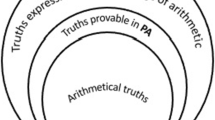Abstract
The paper formulates and proves a strengthening of ‘Frege’s Theorem’, which states that axioms for second-order arithmetic are derivable in second-order logic from Hume’s Principle, which itself says that the number of Fs is the same as the number ofGs just in case the Fs and Gs are equinumerous. The improvement consists in restricting this claim to finite concepts, so that nothing is claimed about the circumstances under which infinite concepts have the same number. ‘Finite Hume’s Principle’ also suffices for the derivation of axioms for arithmetic and, indeed, is equivalent to a version of them, in the presence of Frege’s definitions of the primitive expressions of the language of arithmetic. The philosophical significance of this result is also discussed.
Similar content being viewed by others
Author information
Authors and Affiliations
Rights and permissions
About this article
Cite this article
Heck, R.G. Finitude and Hume’s Principle. Journal of Philosophical Logic 26, 589–617 (1997). https://doi.org/10.1023/A:1004299720847
Issue Date:
DOI: https://doi.org/10.1023/A:1004299720847




